- Home
- Shelby Foote
Chickamauga Page 6
Chickamauga Read online
Page 6
“What did I tell you?” I said to Cap’n Saunders, and I put the money in my pocket.
Well, the laugh was on him then. I wish you could a-seen the expression on his face—he looked mighty sheepish, I tell you. But he admitted hit, you know, he had to own up.
“You were right,” he said. “You won the bet. But—I’ll tell you what I’ll do!” He put his hand into his pocket and pulled out a roll of bills. “I’ve got a hundred dollars left—and with me hit’s all or nothin’! We’ll draw cards fer this last hundred, mine against yorn—high card wins!”
Well, I was ready fer him. I pulled out my hundred, and I said, “Git out the deck!”
So they brought the deck out then and Jim Weaver shuffled hit and held hit while we drawed. Bob Saunders drawed first and he drawed the eight of spades. When I turned my card up I had one of the queens.
Well, sir, you should have seen the look upon Bob Saunders’ face. I tell you what, the fellers whooped and hollered till he looked like he was ready to crawl through a hole in the floor. We all had some fun with him, and then, of course, I gave the money back. I never kept a penny in my life I made from gamblin’.
But that’s the way hit was with me in those days—I was ready fer hit—fer anything. If any kind of devilment or foolishness came up I was right in on hit with the ringleaders.
Well then, Fort Donelson was the funniest fight that I was ever in because hit was all fun fer me without no fightin’. And that jest suited me. And Stone Mountain was the most peculiar fight that I was in because—well, I’ll tell you a strange story and you can figger fer yourself if you ever heared about a fight like that before.
Did you ever hear of a battle in which one side never fired a shot and yet won the fight and did more damage and more destruction to the other side than all the guns and cannon in the world could do? Well, that was the battle of Stone Mountain. Now, I was in a lot of battles. But the battle of Stone Mountain was the queerest one of the whole war.
I’ll tell you how hit was.
We was up on top of the Mountain and the Yankees was below us tryin’ to drive us out and take the Mountain. We couldn’t git our guns up thar, we didn’t try to—we didn’t have to git our guns up thar. The only gun I ever seed up thar was a little brass howitzer that we pulled up with ropes, but we never fired a shot with hit. We didn’t git a chance to use hit. We no more’n got hit in position before a shell exploded right on top of hit and split that little howitzer plumb in two. Hit jest fell into two parts: you couldn’t have made a neater job of hit if you’d cut hit down the middle with a saw. I’ll never fergit that little howitzer and the way they split hit plumb in two.
As for the rest of the fightin’ on our side, hit was done with rocks and stones. We gathered together a great pile of rocks and stones and boulders all along the top of the Mountain, and when they attacked we waited and let ’em have hit.
The Yankees attacked in three lines, one after the other. We waited until the first line was no more’n thirty feet below us—until we could see the whites of their eyes, as the sayin’ goes—and then we let ’em have hit. We jest rolled those boulders down on ’em, and I tell you what, hit was an awful thing to watch. I never saw no worse destruction than that with guns and cannon during the whole war.
You could hear ’em screamin’ and hollerin’ until hit made your blood run cold. They kept comin’ on and we mowed ’em down by the hundreds. We mowed ’em down without firin’ a single shot. We crushed them, wiped them out—jest by rollin’ those big rocks and boulders down on them.
There was bigger battles in the war, but Stone Mountain was the queerest one I ever seed.
* * *
Fort Donelson came early in the war, and Stone Mountain came later toward the end. And one was funny and the other was peculiar, but thar was fightin’ in between that wasn’t neither one. I’m goin’ to tell you about that.
Fort Donelson was the first big fight that we was in—and as I say, we wasn’t really in hit because we couldn’t git to her in time. And after Donelson that spring, in April, thar was Shiloh. Well—all that I can tell you is, we was thar on time at Shiloh. Oh Lord, I reckon that we was! Perhaps we had been country boys before, perhaps some of us still made a joke of hit before—but after Shiloh we wasn’t country boys no longer. We didn’t make a joke about hit after Shiloh. They wiped the smile off of our faces at Shiloh. And after Shiloh we was boys no longer: we was vet’ran men.
From then on hit was fightin’ to the end. That’s where we learned what hit was like—at Shiloh. From then on we knowed what hit would be until the end.
Jim got wounded thar at Shiloh. Hit wasn’t bad—not bad enough to suit him anyways—fer he wanted to go home fer good. Hit was a flesh wound in the leg, but hit was some time before they could git to him, and he was layin’ out thar on the field and I reckon that he lost some blood. Anyways, he was unconscious when they picked him up. They carried him back and dressed his wound right thar upon the field. They cleaned hit out, I reckon, and they bandaged hit—thar was so many of ’em they couldn’t do much more than that. Oh, I tell you what, in those days thar wasn’t much that they could do. I’ve seed the surgeons workin’ underneath an open shed with meatsaws, choppin’ off the arms and legs and throwin’ ’em out thar in a pile like they was sticks of wood, sometimes without no chloroform or nothin’, and the screamin’ and the hollerin’ of the men was enough to make your head turn gray. And that was as much as anyone could do. Hit was live or die and take your chance—and thar was so many of ’em wounded so much worse than Jim that I reckon he was lucky they did anything fer him at all.
I heared ’em tell about hit later, how he came to, a-lyin’ stretched out thar on an old dirty blanket on the bare floor, and an army surgeon seed him lookin’ at his leg all bandaged up and I reckon thought he’d cheer him up and said: “Oh, that ain’t nothin’—you’ll be up and fightin’ Yanks again in two weeks’ time.”
Well, with that, they said, Jim got to cursin’ and a-takin’ on something terrible. They said the language he used was enough to make your hair stand up on end. They said he screamed and raved and reached down thar and jerked that bandage off and said—“Like hell I will!” They said the blood spouted up thar like a fountain, and they said that army doctor was so mad he throwed Jim down upon his back and sat on him and he took that bandage, all bloody as hit was, and he tied hit back around his leg again and he said: “Goddam you, if you pull that bandage off again, I’ll let you bleed to death.”
And Jim, they said, came ragin’ back at him until you could have heared him fer a mile, and said: “Well, by God, I don’t care if I do; I’d rather die than stay here any longer.”
They say they had hit back and forth thar until Jim got so weak he couldn’t talk no more. I know that when I come to see him a day or two later he was settin’ up and I asked him: “Jim, how is your leg? Are you hurt bad?”
And he answered: “Not bad enough. They can take the whole damn leg off,” he said, “as far as I’m concerned, and bury hit here at Shiloh if they’ll only let me go back home and not come back again. Me and Martha will git along somehow,” he said. “I’d rather be a cripple the rest of my life than have to come back and fight in this damn war.”
Well, I knowed he meant hit too. I looked at him and seed how much he meant hit, and I knowed thar wasn’t anything that I could do. When a man begins to talk that way, thar hain’t much you can say to him. Well, sure enough, in a week or two, they let him go upon a two months’ furlough and he went limpin’ away upon a crutch. He was the happiest man I ever seed. “They gave me two months’ leave,” he said, “but if they jest let me git back home old Bragg’ll have to send his whole damn army before he gits me out of thar again.”
Well, he was gone two months or more, and I never knowed what happened—whether he got ashamed of himself when his wound healed up all right, or whether Martha talked him out of hit. But he was back with us again by late July—the grimmest, bitterest-lookin�
�� man you ever seed. He wouldn’t talk to me about hit, he wouldn’t tell me what had happened, but I knowed from that time on he’d never draw his breath in peace until he left the army and got back home fer good.
Well, that was Shiloh, that was the time we didn’t miss, that was where we lost our grin, where we knowed at last what hit would be until the end.
I’ve told you of three battles now, and one was funny, one was strange, and one was—well, one showed us what war and fightin’ could be like. But I’ll tell you of a fourth one now. And the fourth one was the greatest of the lot.
We seed some big fights in the war. And we was in some bloody battles. But the biggest fight we fought was Chickamauga. The bloodiest fight I ever seed was Chickamauga. Thar was big battles in the war, but thar never was a fight before, thar’ll never be a fight again, like Chickamauga. I’m goin’ to tell you how hit was at Chickamauga.
All through the spring and summer of that year Old Rosey follered us through Tennessee.
We had him stopped the year before, the time we whupped him at Stone’s River at the end of ’62. We tard him out so bad he had to wait. He waited thar six months at Murfreesboro. But we knowed he was a-comin’ all the time. Old Rosey started at the end of June and drove us out to Shelbyville. We fell back on Tullahoma in rains the like of which you never seed. The rains that fell the last week in June that year was terrible. But Rosey kept a-comin’ on.
He drove us out of Tullahoma too. We fell back across the Cumberland, we pulled back behind the mountain, but he follered us.
I reckon thar was fellers that was quicker when a fight was on, and when they’d seed just what hit was they had to do. But when it came to plannin’ and a-figgerin’, Old Rosey Rosecrans took the cake. Old Rosey was a fox. Fer sheer natural cunnin’ I never knowed the beat of him.
While Bragg was watchin’ him at Chattanooga to keep him from gittin’ across the Tennessee, he sent some fellers forty mile up stream. And then he’d march ’em back and forth and round the hill and back in front of us again where we could look at ’em, until you’d a-thought that every Yankee in the world was there. But laws! All that was just a dodge! He had fellers a-sawin’t and a-hammerin’, a-buildin’ boats, a-blowin’ bugles and a-beatin’ drums, makin’ all the noise they could—you could hear ’em over yonder gittin’ ready—and all the time Old Rosey was fifty mile or more down stream, ten mile past Chattanooga, a-fixin’ to git over way down thar. That was the kind of feller Rosey was.
We reached Chattanooga early in July and waited fer two months. Old Rosey hadn’t caught up with us yet. He still had to cross the Cumberland, push his men and pull his trains across the ridges and through the gaps before he got to us. July went by, we had no news of him. “Oh Lord!” said Jim, “perhaps he ain’t a-comin!” I knowed he was a-comin’, but I let Jim have his way.
Some of the fellers would git used to hit. A feller’d git into a frame of mind where he wouldn’t let hit worry him. He’d let termorrer look out fer hitself. That was the way hit was with me.
With Jim hit was the other way around. Now that he knowed Martha Patton he was a different man. I think he hated the war and army life from the moment that he met her. From that time he was livin’ only fer one thing—to go back home and marry that gal. When mail would come and some of us was gittin’ letters he’d be the first in line; and if she wrote him why he’d walk away like someone in a dream. And if she failed to write he’d jest go off somers and set down by himself: he’d be in such a state of misery he didn’t want to talk to no one. He got the reputation with the fellers fer bein’ queer—unsociable—always a-broodin’ and a-frettin’ about somethin’ and a-wantin’ to be left alone. And so, after a time, they let him be. He wasn’t popular with most of them—but they never knowed what was wrong, they never knowed that he wasn’t really the way they thought he was at all. Hit was jest that he was hit so desperate hard, the worst-in-love man that I ever seed. But law! I knowed what was the trouble from the start.
Hit’s funny how war took a feller. Before the war I was the serious one, and Jim had been the one to play.
I reckon that I’d had to work too hard. We was so poor. Before the war hit almost seemed I never knowed the time I didn’t have to work. And when the war came, why I only thought of all the fun and frolic I was goin’ to have; and then at last, when I knowed what hit was like, why I was used to hit and didn’t care.
I always could git used to things. And I reckon maybe that’s the reason that I’m here. I wasn’t one to worry much, and no matter how rough the goin’ got I always figgered I could hold out if the others could. I let termorrer look out fer hitself. I reckon that you’d have to say I was an optimist. If things got bad, well, I always figgered that they could be worse; and if they got so bad they couldn’t be no worse, why then I’d figger that they couldn’t last this way ferever, they’d have to git some better sometime later on.
I reckon toward the end thar, when they got so bad we didn’t think they’d ever git no better, I’d reached the place where I jest didn’t care. I could still lay down and go to sleep and not worry over what was goin’ to come termorrer, because I never knowed what was to come and so I didn’t let hit worry me. I reckon you’d have to say that was the Pentland in me—our belief in what we call predestination.
Now, Jim was jest the other way. Before the war he was happy as a lark and thought of nothin’ except havin’ fun. But then the war came and hit changed him so you wouldn’t a-knowed he was the same man.
And, as I say, hit didn’t happen all at once. Jim was the happiest man I ever seed that mornin’ that we started out from home. I reckon he thought of the war as we all did, as a big frolic. We gave hit jest about six months. We figgered we’d be back by then, and of course all that jest suited Jim. I reckon that suited all of us. It would give us all a chance to wear a uniform and to see the world, to shoot some Yankees and to run ’em north, and then to come back home and lord it over those who hadn’t been and be a hero and court the gals.
That was the way hit looked to us when we set out from Zebulon. We never thought about the winter. We never thought about the mud and cold and rain. We never knowed what hit would be to have to march on an empty belly, to have to march barefoot with frozen feet and with no coat upon your back, to have to lay down on bare ground and try to sleep with no coverin’ above you, and thankful half the time if you could find dry ground to sleep upon, and too tard the rest of hit to care. We never knowed or thought about such things as these. We never knowed how hit would be there in the cedar thickets beside Chickamauga Creek. And if we had a-knowed, if someone had a-told us, why I reckon that none of us would a-cared. We was too young and ignorant to care. And as fer knowin’t—law! The only trouble about knowin’ is that you’ve got to know what knowin’s like before you know what knowin’ is. Thar’s no one that can tell you. You’ve got to know hit fer yourself.
Well, like I say, we’d been fightin’ all this time and still thar was no sign of the war endin’. Old Rosey jest kept a-follerin’ us and—“Lord!” Jim would say, “will it never end?”
I never knowed myself. We’d been fightin’ fer two years, and I’d given over knowin’ long ago. With Jim hit was different. He’d been a-prayin’ and a-hopin’ from the first that soon hit would be over and that he could go back and get that gal. And at first, fer a year or more, I tried to cheer him up. I told him that it couldn’t last forever. But after a while hit wasn’t no use to tell him that. He wouldn’t believe me any longer.
Because Old Rosey kept a-comin’ on. We’d whup him and we’d stop him fer a while, but then he’d git his wind, he’d be on our trail again, he’d drive us back.— “Oh Lord!” said Jim, “will hit never stop?”
That summer I been tellin’ you about, he drove us down through Tennessee. He drove us out of Shelbyville, and we fell back on Tullahoma, to the passes of the hills. When we pulled back across the Cumberland I said to Jim: “Now we’ve got him. He’ll have to cross the mountain
s now to git at us. And when he does, we’ll have him. That’s all that Bragg’s been waitin’ fer. We’ll whup the daylights out of him this time,” I said, “and after that thar’ll be nothin’ left of him. We’ll be home by Christmas, Jim—you wait and see.”
And Jim just looked at me and shook his head and said: “Lord, Lord, I don’t believe this war’ll ever end!”
Hit wasn’t that he was afraid—or, if he was, hit made a wildcat of him in the fightin’. Jim could get fightin’ mad like no one else I ever seed. He could do things, take chances no one else I ever knowed would take. But I reckon hit was jest because he was so desperate. He hated hit so much. He couldn’t git used to hit the way the others could. He couldn’t take hit as hit came. Hit wasn’t so much that he was afraid to die. I guess hit was that he was still so full of livin’. He didn’t want to die because he wanted to live so much. And he wanted to live so much because he was in love.
… So, like I say, Old Rosey finally pushed us back across the Cumberland. He was in Chattanooga in July, and fer a few weeks hit was quiet thar. But all the time I knowed that Rosey would keep comin’ on. We got wind of him again along in August. He had started after us again. He pushed his trains across the Cumberland, with the roads so bad, what with the rains, his wagons sunk down to the axle hubs. But he got ’em over, came down in the valley, then across the ridge, and early in September he was on our heels again.
We cleared out of Chattanooga on the eighth. And our tail end was pullin’ out at one end of the town as Rosey came in through the other. We dropped down around the mountain south of town and Rosey thought he had us on the run again.
But this time he was fooled. We was ready fer him now, a-pickin’ out our spot and layin’ low. Old Rosey follered us. He sent McCook around down toward the south to head us off. He thought he had us in retreat but when McCook got thar we wasn’t thar at all. We’d come down south of town and taken our positions along Chickamauga Creek. McCook had gone too far. Thomas was follerin’ us from the north and when McCook tried to git back to join Thomas, he couldn’t pass us, fer we blocked the way. They had to fight us or be cut in two.

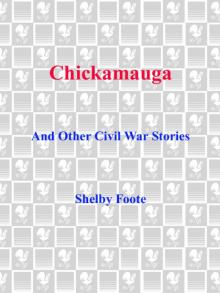 Chickamauga and Other Civil War Stories
Chickamauga and Other Civil War Stories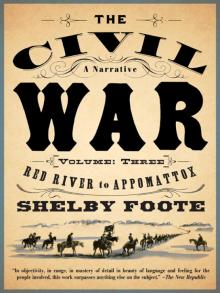 The Civil War: A Narrative: Volume 3: Red River to Appomattox
The Civil War: A Narrative: Volume 3: Red River to Appomattox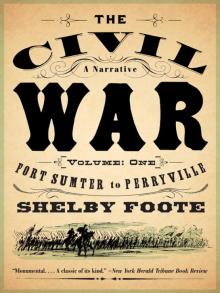 The Civil War: A Narrative: Volume 1: Fort Sumter to Perryville
The Civil War: A Narrative: Volume 1: Fort Sumter to Perryville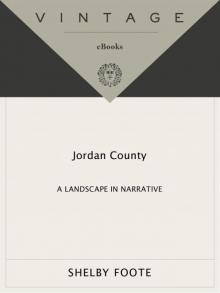 Jordan County
Jordan County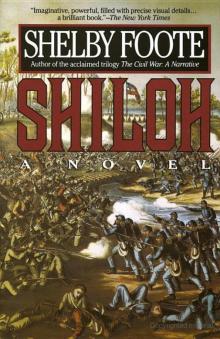 Shiloh
Shiloh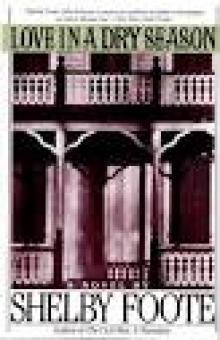 Love in a Dry Season
Love in a Dry Season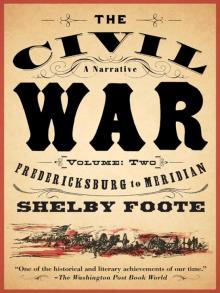 The Civil War: A Narrative: Volume 2: Fredericksburg to Meridian
The Civil War: A Narrative: Volume 2: Fredericksburg to Meridian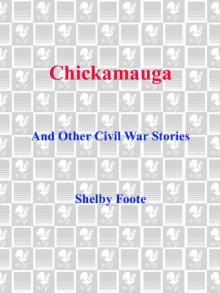 Chickamauga
Chickamauga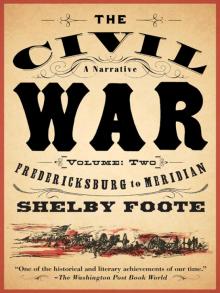 The Civil War: A Narrative: Fredericksburg to Meridian
The Civil War: A Narrative: Fredericksburg to Meridian